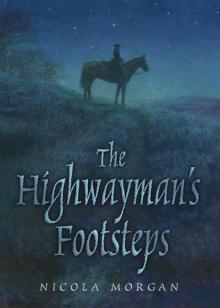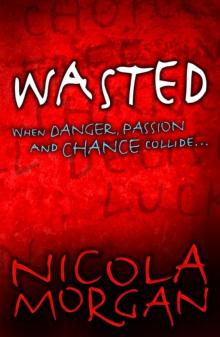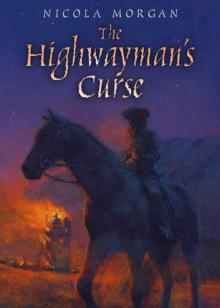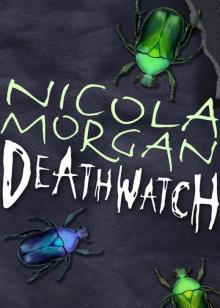- Home
- Nicola Morgan
The Highwayman's Footsteps Page 2
The Highwayman's Footsteps Read online
Page 2
I must wait. Still she mumbled and pointed. “Hush,” I said. “Wait a little.”
“Water.” Her voice sounded slurred, as though her lips or tongue were swollen. “My bag.”
As I tried to quieten her, the moon at last returned and I could see the darkened doorway once more. With my heart thumping faster now, I walked towards it. Inside was dark as pitch. I entered, straining my ears in the silence, my arms in front of me, ready for what I might find. My feet stumbled on an object. I crouched down. It was soft – a cloak, and the bag. Beneath them lay something hard – the matching pistol. I picked them all up and went back to the girl.
Inside the bag I found a bottle, corked. I pulled the cork out and sniffed. It had a slightly musty smell of old water, but not excessively old. I was about to put it to my lips, but, despite my terrible thirst, I could not do so. I held it to the girl’s mouth and carefully trickled some between her lips. Most of it was wasted as it trickled out again.
“You,” she said, licking at her lips. “You drink.”
I did as she told me, surprised that she had the grace to think of me. Feeling somewhat guilty, as though I should be helping her and not the other way round, I took only what I needed. I poured some more between her lips.
I knew not the proper way to behave towards her. She was a criminal; she had tried to kill me; she was no lady; yet, despite everything, I had been born a gentleman and she was weaker than I. But these were strange times and I must do what needed to be done. Whatever that seemed to be, I must try to do the right thing.
There was bread in her bag, too, a part loaf, dried at the edges but edible. I broke some and offered it to her but she closed her mouth and shook her head. I tried again but still she would not eat. I knew not if it was right to eat or not to eat with a fever. But I recalled that animals usually knew what was best for them during illness and I hoped this might be the same for her.
In the moonlight, I looked at the bread. My hunger now was intense and my mouth watered. This was not the time to wait, not the time to remember my manners. I was hungry and she was not. I ate as quickly as I could.
I listened to her strained breathing, watched her closed flickering eyes with dread. I did not know her but I could not bear the thought of her – anyone – dying here, now, in front of me. And then my being left alone.
I must help her. Whatever the foolishness of it, despite the fact that she had planned to kill me, despite the fact that I was on the run myself and did not want to be held back by an injured girl, despite the fact that she was a criminal, and that I had nothing in common with her, I had to help her. As one person to another, as two people in need, we were linked.
Chapter Four
“How were you hurt?” I wanted her to stay awake, not to drift into a frightening place, frightening for both of us. I thought that if I made her talk, she could not die. It had begun to matter to me that she should not die.
Her voice was little more than a soft moan. Her breathing seemed so faint that at any moment it might float away entirely. “Pistol.”
A pistol wound? If so, then what chance did she have to recover? “I need to see. I need to move you a little,” I said.
As I carefully turned her onto her back, she made no sound, but I could feel her muscles tighten and her breath freeze as she tried not to cry out. She kept her hand pressed against her side.
“I must move you a little more. Into the moonlight. So that I may see.” I crouched behind her and slid both hands under her body, shifting her as gently as possible towards the place where the moonlight pooled on the ground. A whimper escaped from her as I settled her down again. I took her black-gloved hand and eased it away from her side.
I winced for her as I looked at it. A long straight slice through the thin flesh over her ribs. The lead ball must have been a hair’s breadth from entering her, ripping the clothes as it passed. It was not a new wound, from the look of it. The edges were an inch apart, raw, and swollen. Blackened too, from the heat of the bullet’s passage. There was now only a slow trickle of blood. She must have sustained the injury some days ago and it had come apart in the sudden effort of stealing my purse. Although I may not have known how to deal with fever, I had seen wounds before. Would my knowledge of the treatment of animals help me with this girl’s injury?
My father had always told me to leave such things to our servants, but I could not agree. It was one of the things he despised about me – my softness in the face of suffering, whether human or animal. If I could not bear the pain of others, how could I face pain myself? He told me that if I could not toughen myself then, by God, he would toughen me himself in his militia. His harsh words, his contempt, did nothing to toughen me, only drove me to anger and hurt.
I had wished to attend boarding school, like my brother, but my father said that I was not clever enough for the Law or the Church and I would be better having lessons at home like my sisters. But when my tutor died, more than two years past now, I had begged to be allowed to go to the Grammar school. My father agreed – he was glad, I supposed, to have me away from the house. The happiest days of my life were spent with Harry and Robert and the other boys, reciting Latin verbs, tables, the dates of the Kings and Queens of England – and trying to trick the masters into amusing diversions. And, as I grew taller, and broader and stronger, I had felt myself to be something of a leader, well-liked and respected. There was nothing they could do that I could not. But these feelings disappeared when I returned each evening to my home, where bitterness took over and I felt small and weak.
I put these thoughts away now and tried to decide how to help the girl’s injury and fever. I knew that if this was a wounded horse I should need a mixture of certain herbs, pounded and mashed into a poultice to draw out the poison. Surely the same would work for a person? But I did not have the herbs, nor any way to find them. For now, all I could do was to pray that she would survive the night. In the morning, I would go to the nearby village and buy such physic as I could. And I would find us food.
Meanwhile, I made a pad of the only clean shirt I had brought with me and pressed it firmly to her wound, keeping it in place with her own torn shirt and jacket. I shut my ears to the pain she suffered while I did this but she knew why it had to be so. The wound must be closed as much as possible and protected from the terrible poisons of the night air. I made her the best pillow that I could with her bag, and covered her with her own warm cloak.
I explained what I would do in the morning. I could not tell if she grasped this, as she drifted in and out of wakefulness, sometimes muttering words I could not understand. Sliding down onto the ground, leaning against the wall, I sat close to her and began to wait for the morning to come. Once, after a short while, her hand moved towards mine in her sleep and I clasped it in the darkness, unseen by the world. I do not think she knew what she did, though I blushed in the night for such impropriety and hoped she would not remember in the morning. As I took her hand, our fates were sealed, locked together by chance and the foolish things that humans do to each other.
As the night settled into its heavy silence, my heart slowed and sank and dark thoughts flooded my mind. What had I done? What would happen now? How long could this girl and I survive? She was a criminal – how could I trust her? Would we be caught and face the hangman’s noose or would we manage to escape for a few hours or days or weeks, spending every moment terrified, only to be shot down like dogs in the dirt when the soldiers eventually caught us? What did it feel like to die? And who would ever know or care about us?
I knew only that at this time, there seemed no choice. I did not wish to be alone. You may say I stayed with her because I was too afraid of loneliness. Or you may say I stayed because I could not honourably leave her to die. I do not, in all honesty, know which would be closer to the truth.
Chapter Five
I slept little and lightly. This was the fourth night since I had left my comfortable bed at home, and a hard damp floor no longer seemed s
trange to me. But my head was full of what I must do the next day. Besides, I was afraid to sleep too deeply, in case an intruder came and I did not hear until it was too late.
The winter iciness seeped through my skin, chilling me to my bones. The girl muttered in her fevered sleep and I fretted for her condition in this hostile cold. I moved my body closer to her, for both our sakes, though not too close. It would not have been proper. And I did not look at her.
I wondered about her, however. How could I not? What sort of villain was she? She appeared to be a highwayman – not that I had seen one, but I had heard tell of them often enough. I did not believe I had heard of a woman turning to that dangerous way of life, though plenty of women were hanged for robbery of other sorts. A highwayman’s life was no life for a young girl: a life of constant danger, as her pistol wound testified. I could not help but want to know more about my strange companion.
And oddly, just for a short moment, I envied her the freedom she must have. She could do as she wished, go where she desired. No one would expect anything of her.
In my wakeful moments, I listened to the sounds of the night: the eerie call of a hunting owl, an occasional distant shout, once a horse’s clatter on the rough road, the rustlings and scuttlings of night creatures. Into my fitful dreams floated different sounds: roaring wind and the thunder of cannons and the terrible screams of men dying and my father’s scornful words, saying “Coward, boy! You are nothing more than a lily-livered coward. You are no son of mine. I would I had another daughter to mewl and cringe, for you are as useless.”
At last, my dreams receded and the small noises outside changed into the sounds of morning, as the ragged moonlight through the window softened slowly into a cold grey dawn.
Painfully, I stood up, hunger clawing at my guts and my mouth dry as straw. The girl stirred. I felt her brow. It was burning hot still, and yet her whole body shivered. I pushed her shoulder slightly. Her eyes opened. She stared at me without seeming to understand. Frightened, she tried to move, but immediately gasped with pain.
I steadied her. “Stay still. You must not move.” I offered some water to her lips and she drank greedily.
“Who are you?” she asked, though not clearly. Her voice sounded distant and strained.
“My name is William. We will talk when I return but first I must go and fetch physic for you.” I did not wish her to know more of me, of my status or my wealth.
She tried to sit again. “My horse!” she said, her voice agitated. “My horse!”
There was still no sign or scent of any horse. It must have long gone. “There is no horse,” I said. “I am sorry.”
“I fell. I was weakened by this.” Her hand flapped towards her injured side. “A day, two days ago. More. I forget.” Her words were slurring. “He needs … I need him.”
That, I could believe. A horse must be the most valuable of all her possessions. It would be the difference between life and death to her. I wished I had my horse. But when I consider that more carefully, I am forced to admit that if I had had my horse, I almost certainly would not have been there at all. I would have been many miles away. But I could not have taken my horse without being noticed.
She was silent at first, only breathing fast and shallowly. When she spoke, her voice sounded oddly strong. “I know where he will be. He will have gone home.” She sank back onto the ground, wincing again as she did so.
“Let me find him. Tell me where and I will fetch him back.” Was I mad? Could I take the risk?
“I cannot.”
“Why, cannot?”
She said nothing. And then I knew. She did not trust me! She thought I would steal her horse and ride away. Fury flared inside me. Why was I helping her if she did not trust me? Why did I not just leave her here? Better still, why did I not make her tell me where her horse was and then ride away with it, putting many miles between myself and the soldiers?
I almost smiled at this foolish thought. How could I blame the girl for not trusting me when I had just had the very same tempting thought? Would I have trusted a stranger if I had been in her position? Would I have told her where my horse was and given her the opportunity to steal it?
I had no intention of leaving her. It would not have been honourable. Perhaps she did not understand such matters, criminal that she was, but I had been raised always to do the right thing.
The right thing! Was stealing money the right thing?
No. I was a felon, like her, no better and no worse.
Chapter Six
“I shall be back as soon as I can,” I simply said. “Do not try to move.”
Before I left, I made such changes as I could to my appearance, hoping that I would not meet soldiers who might recognize me. With some water, I adjusted my hair, after loosening it from the small pigtail I had worn yesterday. I left my cloak and hat behind. I would be walking fast, so my thick jacket would suffice to keep me warm. And it was dirty enough now that I would look nothing like a rich boy. Besides, it was not my own, but one taken from a stable boy while he slept. He had been smaller than I, and my broad shoulders strained slightly at the coarse material, my thin, bony wrists and large hands hanging too far from the sleeves. I hoped someone would buy him a new one. A kerchief tied around my neck came next, and I imagined that I must look very different from the neat-haired, soft-faced boy who had left his wealthy home days before. I felt different, too. The eyes through which I saw the world had changed.
I took two coins from the purse and left the rest with her. I placed the purse touching her hand, so she would know I was not taking it and disappearing for ever.
The pistols lay on the ground. Should I take them? I was much tempted. But if I were caught, it would mean more trouble for me. I checked the priming and left them, half-cocked, by the girl’s side, where she could reach them if need be.
Cautiously, I walked through the doorway and looked around. It seemed more than a few hours since I had taken refuge in this place and found myself at the end of a pistol. At that moment I had expected to die, but here I was, still alive several hours later. And I was no less frightened now than I had been then. Then, I had been almost resigned to what would happen, ready for the final sound of the explosion in my head; now, I was facing unknown danger.
I must stop thinking about danger and merely act.
I peered through the misted greyness and set off towards the village, slinging my empty bag over my shoulder. A knife nestled in my pocket, along with the two coins.
As I walked quickly down the sloping road, all my senses were alert. The hills seemed to be watching me, as though they knew who I was and would pass that information to any searching soldiers if they wished.
I said a prayer, for forgiveness and for protection. Would my prayer be answered? I could not say.
Chapter Seven
After somewhat less than half an hour, I could make out the first houses ahead of me, tombstone shadows on a grey landscape. In the cold, wet light of a winter morning, I came to the village. My heart began to beat a little faster. What if the soldiers were there? What if this were the only village nearby and they had guessed I would come here? What if they did recognize me despite all my efforts?
Now, I was within sight of windows, some dark, others spilling an orange light onto the street. Although it was early, several people were about, collars turned up, hats squashed down, shoulders hunched, breath like smoke in the white frosty air. I walked on. The warm sweet smell of freshly baked bread came over me and my mouth watered. The bakery was opening and I bought two loaves, straight from the oven, and held their heat to my chest before putting them in my bag.
“Passing through,” I said in answer to the baker’s question, roughening my voice as much as I could. “With my master. We ’ave far to go and an early start.” It satisfied him, and his lack of curiosity gave me confidence.
Within half an hour, more people were out and about, and I had purchased cheese and a piece of ham as well as the bread. Now I
had need of an apothecary.
I found him soon enough, though his angry face when I woke him made me wish I had waited another hour. His nose was purple, his skin streaked with broken red lines. He had the look of someone who has drunk too much, and for too long. My father had a manservant once who had that look. We found him one morning, drowned, face down in the horses’ water trough, the gin flagon empty beside him.
“My master is hurt,” I said. “A cut, some three days old. He has a fever. I need—” and I was just about to tell him what I needed when he interrupted, swinging the oil lamp so that it hissed and spluttered dangerously.
“It is for me to tell you what you need. I was not roused from my bed before dawn to listen to some puppy pretend he has some knowledge.” I decided not to mention that it was, in truth, now well after dawn. I merely said I was sorry and thanked him as well as I could manage.
The man’s eyes were gummed with crusted yellow matter. He had little hair and what there was floated like an ancient cobweb behind his skull. God had given him more skin than was necessary and it hung around him in folds, so that when he moved, the creases separated grotesquely, revealing the grime of months or years. He smelt sickly and festering.
Before speaking further, he pressed a finger against one nostril and blew sharply through the other one, sending snot to the floor by my feet. “Has the blood ceased flowing?”
“I think it has. There was fresh blood some hours ago, but there is nothing now.”
“Is the flesh blackened? Is the matter exuding from it white or has it darkened to thick yellow? Does your master sweat? Is he cold or does he shout and throw his blankets off? Does a rash cover his body? Does his breath reek?”

 The Highwayman's Footsteps
The Highwayman's Footsteps Wasted
Wasted The Highwayman's Curse
The Highwayman's Curse Deathwatch
Deathwatch